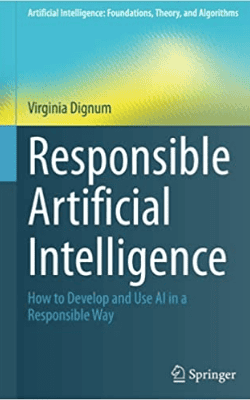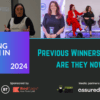
Following a discussion on Netflix’s ‘Coded Bias’, our panel of experts have shared their top picks for those interested in learning more about Artificial Intelligence
Artificial Intelligence is being increasingly incorporated into various industries, raising questions and concerns about how it can impact organisations and consumers alike.
The following books are recommendations given by cybersecurity experts after discussing the ethical implications of AI, which can give useful insight into its developments and the morals behind it while also providing an in-depth analysis of different use-cases.
Tina Woods’ – CEO & Founder of Collider Health – recommendations:
Deep Medicine’ by Eric Topol
Blurb: A visit to a physician these days is cold: physicians spend most of their time typing at computers, making minimal eye contact. Appointments generally last only a few minutes, with scarce time for the doctor to connect to a patient’s story, or explain how and why different procedures and treatments might be undertaken. As a result, errors abound: indeed, misdiagnosis is the fourth-leading cause of death in the United States, trailing only heart disease, cancer, and stroke. This is because, despite having access to more resources than ever, doctors are vulnerable not just to the economic demand to see more patients, but to distraction, burnout, data overload, and their own intrinsic biases. Physicians are simply overmatched. The American health care system needs a serious reboot, and artificial intelligence is just the thing to press the restart button. As innovative as it is hopeful, Deep Medicine ultimately shows us how we can leverage artificial intelligence for better care at lower costs with more empathy, for the benefit of patients and physicians alike.
*Blurb taken from World of Books
Lifespan: Why We Age – and Why We Don’t Have to by David Sinclair
Blurb: For decades, the medical community has looked to a variety of reasons for why we age, and the consensus is that no-one dies of old age; they die of age-related diseases. That’s because ageing is not a disease – it is inevitable. But what if everything you think you know about ageing is wrong? What if ageing is a disease? And that disease is curable.
In Lifespan, Dr David Sinclair, one of the world’s foremost authorities on genetics and ageing, argues just that. He has dedicated his life’s work to chasing more than a longer lifespan – he wants to enable people to live longer, healthier, and disease-free well into our hundreds. In this audiobook, he reveals a bold new theory of ageing, one that pinpoints a root cause of ageing that lies in an ancient genetic survival circuit.
*Blurb taken from Amazon
Blurb: The prospect of living to 200 years old isn’t science fiction anymore. A leader in the emerging field of longevity offers his perspective on what cutting\-edge breakthroughs are on the horizon, as well as the practical steps we can take now to live healthily to 100 and beyond. In The Science and Technology of Growing Young, industry investor and insider Sergey Young demystifies the longevity landscape, cutting through the hype and showing readers what they can do now to live better for longer, and offering a look into the exciting possibilities that await us. By viewing aging as a condition that can be cured, we can dramatically revolutionize the field of longevity and make it accessible for everyone. Combining practical advice with an incredible overview of the brave new world to come, The Science and Technology of Growing Young redefines what it means to be human and to grow young.
*Blurb taken from Amazon
Tina has also written her own book titled ‘Live Longer with AI‘!
Blurb: Live Longer with AI examines how the latest cutting-edge developments are helping us to live longer, healthier and better too. It compels us to stop thinking that health is about treating disease and start regarding it as our greatest personal and societal asset to protect.
The book discusses the impact that AI has on understanding the cellular basis of aging and how our genes are influenced by our environment – with the pandemic highlighting the interconnectedness of human and planetary health.
*Blurb taken from Amazon
Tom Dyers’ – Head of Research & Development at Behold.ai – Recommendations:
Weapons of Math Destruction by Cathy O’Neil
Blurb: A former Wall Street quant sounds an alarm on the mathematical models that pervade modern life – and threaten to rip apart our social fabric. We live in the age of the algorithm. Increasingly, the decisions that affect our lives – where we go to school, whether we get a loan or need to borrow money, how much we pay for insurance – are being made not by humans, but by mathematical models. In theory, this should lead to greater fairness: everyone is judged according to the same rules, and bias is eliminated. And yet, as Cathy O’Neil reveals in this urgent and necessary book, the opposite is true. The models being used today are opaque, unregulated, and incontestable, even when they’re wrong. Most troubling, they reinforce discrimination. Tracing the arc of a person’s life, O’Neil exposes the black box models that shape our future, both as individuals and as a society. These “weapons of math destruction” score teachers and students, sort CVs, grant or deny loans, evaluate workers, target voters, and monitor our health.
*Blurb taken from Amazon
New Laws of Robotics by Frank Pasquale
Blurb: Too many CEOs tell a simple story about the future of work: if a machine can do what you do, your job will be automated. They envision everyone from doctors to soldiers rendered superfluous by ever-more-powerful AI. They offer stark alternatives: make robots or be replaced by them. Another story is possible. In virtually every walk of life, robotic systems can make labor more valuable, not less. Frank Pasquale tells the story of nurses, teachers, designers, and others who partner with technologists, rather than meekly serving as data sources for their computerized replacements. This cooperation reveals the kind of technological advance that could bring us all better health care, education, and more, while maintaining meaningful work. These partnerships also show how law and regulation can promote prosperity for all, rather than a zero-sum race of humans against machines.
*Burb taken from Amazon
The Health Gap: The Challenge of an Unequal World by Michael Marmot
Blurb: There are dramatic differences in health between countries and within countries. But this is not a simple matter of rich and poor. A poor man in Glasgow is rich compared to the average Indian, but the Glaswegian’s life expectancy is 8 years shorter. The Indian is dying of infectious disease linked to his poverty; the Glaswegian of violent death, suicide, heart disease linked to a rich country’s version of disadvantage. In all countries, people at relative social disadvantage suffer health disadvantage, dramatically so. Within countries, the higher the social status of individuals the better is their health. These health inequalities defy usual explanations. Conventional approaches to improving health have emphasised access to technical solutions – improved medical care, sanitation, and control of disease vectors; or behaviours – smoking, drinking – obesity, linked to diabetes, heart disease and cancer. These approaches only go so far. Creating the conditions for people to lead flourishing lives, and thus empowering individuals and communities, is key to reduction of health inequalities.
*Blurb taken from Amazon
Voices from the Valley by Ben Tarnoff and Moira Weigel
Blurb: In Voices from the Valley, the celebrated writers and Logic cofounders Moira Weigel and Ben Tarnoff take an unprecedented dive into the tech industry, conducting unfiltered, in-depth, anonymous interviews with tech workers at all levels, including a data scientist, a start-up founder, a cook who serves their lunch, and a PR wizard. In the process, Weigel and Tarnoff open the conversation about the tech industry at large, a conversation that has previously been dominated by the voices of CEOs. Deeply illuminating, revealing, and at times lurid, Voices from the Valley is a vital and comprehensive view of an industry that governs our lives. FSG Originals × Logic dissects the way technology functions in everyday lives. The titans of Silicon Valley, for all their utopian imaginings, never really had our best interests at heart: recent threats to democracy, truth, privacy, and safety, as a result of tech’s reckless pursuit of progress, have shown as much. We present an alternate story, one that delights in capturing technology in all its contradictions and innovation, across borders and socioeconomic divisions, from history through the future, beyond platitudes and PR hype, and past doom and gloom. Our collaboration features four brief but provocative forays into the tech industry’s many worlds and aspires to incite fresh conversations about technology focused on nuanced and accessible explorations of the emerging tools that reorganize and redefine life today.
*Blurb taken from Amazon
Virginia Dignum’s – Professor of Responsible Artificial Intelligence at Umeå University – Recommendations:
Atlas of AI: Power, Politics, and the Planetary Costs of Artificial Intelligence by Kate Crawford
Blurb: Atlas of AI deals with how, practically, AI gets into and plays out in our lives. It shows that AI is an extractive industry, exploiting resources from materials to labour and information. Crawford’s collection exposes the dark side of AI success. It traverses the globe exploring the relationships between places and their impact on AI infrastructure. From Nevada and Indonesia, where the lithium and tin central to semiconductors are mined at great human and environmental cost, we travel to an Amazon warehouse in New Jersey. Here, labourers bend their bodies to the will of robots and production lines, instead of the automation adapting to human tempo. In an uneasy reminder of Charlie Chaplin’s 1936 film Modern Times, we witness the hardship of “fauxtomation” — supposedly automated systems that rely heavily on human labour, such as that of workers paid below minimum wage in data-labelling farms. Crawford concludes with the arresting reminder that AI is not objective, neutral or universal. Instead, it is deeply embedded in the culture and economic reality of those who make it — mostly, the white, wealthy men of California’s Silicon Valley.
The Alignment Problem: How Can Machines Learn Human Values? by Brian Christian
Blurb: In the Alignment Problem, writer Brian Christian gives an intimate view of the people making AI technology — their aims, expectations, hopes, challenges and desolations. Starting with Walter Pitts’s work on a logical representation of neuron activity in the early twentieth century, he recounts the ideas, aims, successes and failures of researchers and practitioners in fields from cognitive science to engineering. Christian tracks the evolution of AI technology, from prophecy to ubiquity. He shows how researchers try to get AI to interpret human values such as fairness, transparency, curiosity and uncertainty, and the challenges that stand in their way. Largely based on encounters with researchers and practitioners, the book charts a slow, steady, complex progress, with many lows and some incredible highs. At its core, The Alignment Problem asks how we can ensure that AI systems capture our norms and values, understand what we mean and do what we want. We all have different conceptions of and requirements for what such systems should do. As mathematician Norbert Wiener put it in 1960: “We had better be quite sure that the purpose put into the machine is the purpose which we really desire.”
See more of Virginia’s review of Kate Crawford and Brian Christian’s books here
Virginia has also written her own book titled ‘Responsible Artificial Intelligence: How to Develop and Use AI in a Responsible Way’
Blurb: In this book, the author examines the ethical implications of Artificial Intelligence systems as they integrate and replace traditional social structures in new sociocognitive-technological environments. She discusses issues related to the integrity of researchers, technologists, and manufacturers as they design, construct, use, and manage artificially intelligent systems; formalisms for reasoning about moral decisions as part of the behavior of artificial autonomous systems such as agents and robots; and design methodologies for social agents based on societal, moral, and legal values. Throughout the book the author discusses related work, conscious of both classical, philosophical treatments of ethical issues and the implications in modern, algorithmic systems, and she combines regular references and footnotes with suggestions for further reading. This short overview is suitable for undergraduate students, in both technical and non-technical courses, and for interested and concerned researchers, practitioners, and citizens.
*Blurb taken from Amazon


















